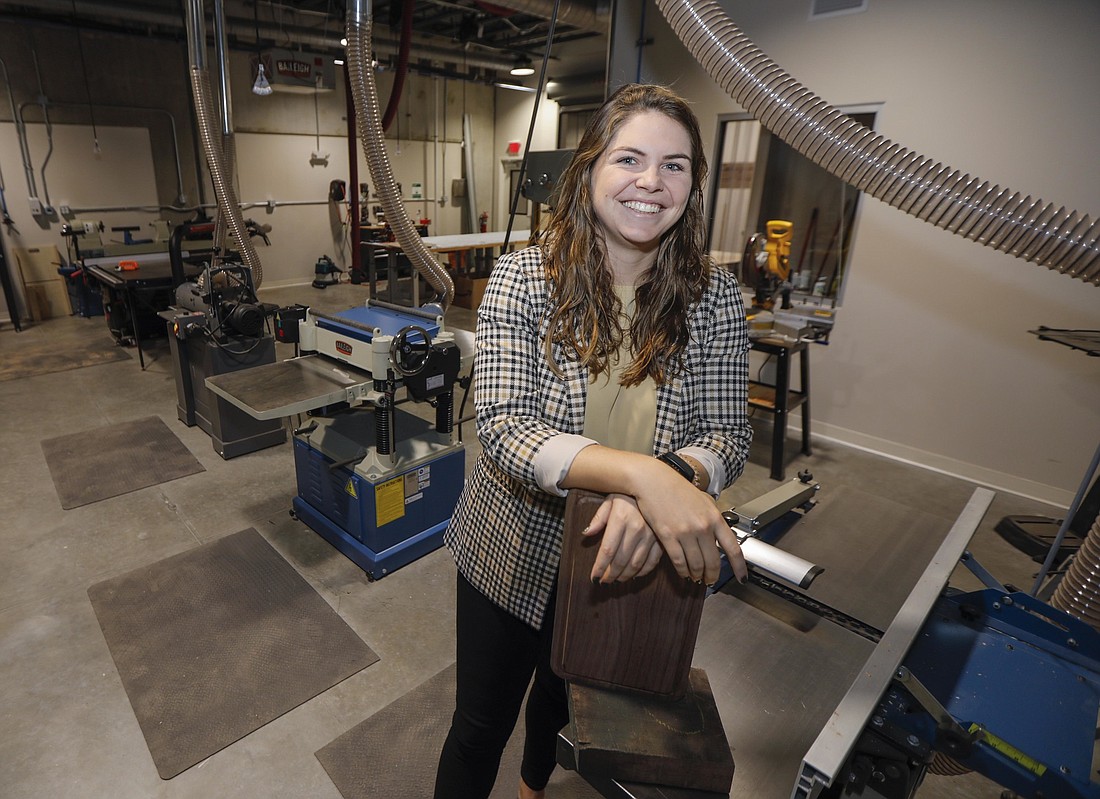- April 11, 2025
-
-
Loading

Loading

In early 2020, Lakeland Catapult moved out Bank of America’s basement and into a building four times larger four blocks away — a pivotal step in progressing from subsidized public-private initiative to independent self-sustained nonprofit.
“When we’re talking with prospective members, we talk about where their journey goes after Catapult.” Maggie Leach, Catapult Kitchen Director
But, like many of the 200-plus entrepreneurs who’ve founded businesses there, Catapult’s launch-to-growth transition weathered turbulence — with bad luck and bad timing aggravating and extending anticipated challenges in over-capacity and increased operating costs. Now, going into 2022, the organization is primed to quickly expand on its original mission: to help successful businesses launch and prosper.
With $233,000 in seed contributions, the city of Lakeland, Lakeland Economic Development Council (LEDC) and Lakeland-based GiveWell Foundation founded Catapult in 2013 as a business incubator. It outgrew its 10,000-square-foot berth in the downtown BofA building on South Florida Avenue within two years.
LEDC in 2015 purchased the former Lakeland Cash Feed building for $850,000 and, with $10 million pledged by GiveWell Foundation, planned to renovate the 1937 structure into ’Catapult 2.0,’ tripling its size and scope to include ‘maker space’ for manufacturing.
The bad luck was September 2017’s Hurricane Irma, which destroyed the Cash Feed building, setting expansion back to square one.
The bad timing came after the new $13 million, 38,000-square-foot ‘Catapult 3.0’ — its three-story arched glass facade shimmering on Lake Mirror — opened in February 2020, weeks before COVID-19 closed its doors for more than seven weeks.
By the time it reopened, about 40% of Catapult’s entrepreneurs, startups and small businesses had canceled their $130 monthly memberships.
“We lost 60 members,” Catapult President Chistin Strawbridge says. “People were cutting costs, changing jobs, everything went crazy.”
Now, 18 months later, Catapult has more than 230 “industry-diverse” members, she says, and “a lot of capacity. We could double — have 400 members,” she says.
Catapult, which receives about 70% of its $1 million annual budget in contributions from 22 corporate and individual sponsors, also has a refined mission reflecting its independent status and goal to self-generate at least 50% of its operating costs.
“For the last five years, the focus has been on this building,” Strawbridge says. “Now, with the completion of the ‘Maker Space,’ we’re shifting our gears in 2022 by continuing to add mentorship and funding opportunities” honed to accelerate launch-to-growth transition.
The emphasis is “velocity to launch,” Assistant Director Christiaan Abbott says, by using analytics to leverage “utilization of Catapult amenities” into better launch-to-growth outcomes for “Lakelanders to create brick-and-mortar businesses to grow in Lakeland.”
“The end goal,” adds Maker Space Director Brett Chamberlain of most 22 members signed into his program, “is to get them operating their own manufacturing facility.”
To improve launch-to-growth outcomes, Catapult is recruiting members with emphasis on replicable concepts and potential to outgrow their subsidized cradles.
“When we’re talking with prospective members, we talk about where their journey goes after Catapult,” says Kitchen Director Maggie Leach, who manages a consumer packaged goods and pre-restaurant/bakery program that has produced 27 culinary businesses — most created in Catapult’s original 200-square-foot basement kitchen.
Now, with a 5,000-square-foot commercial food-production plant available, more than 60 entrepreneurs have enrolled in Catapult 3.0’s kitchen program. There they have access to all amenities for $5-$10 an hour and assistance in certifications, permits, licensing and marketing.
Applying for a Catapult kitchen membership — vetting includes securing certifications — is “great for taking that first step,” Leach says, before cautioning the program is a process designed to rescue or discard startups that “are not scalable.”
Accelerating growth by incorporating scalability into a startup’s DNA is a practice Strawbridge and her 10-person staff preaches with reinforcement from 50 volunteer “experts-in-residence,” such as retired Publix Creative Services Director Tim Cox. He’s guided 75 Catapult members since joining in April.
“We want to bring the right people, high-energy people, into this space,” says Strawbridge, acknowledging the nonprofit must differentiate itself from commercial coworking spaces such as Ohio-based COHatch, which opens in downtown Lakeland in 2022.
“COHatch moving into Lakeland is a great opportunity — they see something in Lakeland,” she says. “But we don’t want to be in the co-office space business, just be someone’s office space. We also provide valuable connections, mentorship and funding opportunities. As a nonprofit, people are our priority.”
“Cheap office space competition are great compliments to what we do,” Abbott adds, noting Catapult’s scaled-to-grow startups bear fruit seeded amid an ambient electric anything-is-possible vibe and a cross-pollinated pool of collaborative talents, skills and knowhow. “The coolest thing is they all learn things from each other they use in their work.”
“Give them tools and time and they’re going to make something productive,” Chamberlain says of ‘Maker Space’ members, who share a Catapult trait: “You can have a random focus group on any topic at any time.”